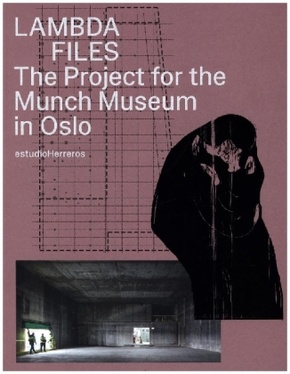LAMBDA FILES - The Project for the Munch Museum in Oslo
| Verlag | Spector Books |
| Auflage | 2022 |
| Seiten | 240 |
| Format | 20,9 x 2,1 x 26,6 cm |
| Gewicht | 804 g |
| Artikeltyp | Englisches Buch |
| ISBN-10 | 3959056206 |
| EAN | 9783959056205 |
| Bestell-Nr | 95905620A |
Edvard Munch hat sein Werk der Stadt Oslo vermacht, die die Möglichkeit ergriffen hat, es in einem neuen Museum zu präsentieren. Hier beginnt die Geschichte des Lambda. Das Buch erkundet den Entwurf und Bau des Gebäudes, das vom estudioHerreros aus Madrid entwickelt und im Oktober 2021 eröffnet wurde. Der Titel Lambda Files greift das Pseudonym auf, das verwendet wurde, um die Anonymität der Architekt·innen im internationalen Wettbewerb zu wahren: Der Name wurde überraschenderweise in der Öffentlichkeit und von den Medien aufgenommen und auch weiterhin verwendet, um das Projekt zu benennen. Das Buch taucht tief in die Archive des estudioHerreros und bringt den "Papierkram" ans Licht, der üblicherweise in Publikationen keine Rolle spielt, aber eine sehr genaue Dokumentation der professionellen, politischen, sozialen und technischen Zusammenhänge ermöglicht, in denen dieses Projekt stand und steht. Für die Autor·innen führt das Munch-Projekt zur Auseinandersetzung mit einer Reihe he utiger Fragen, etwa nach der Bedeutung von Museen, wenn es darum geht, Geschichte neu zu schreiben und eine bessere Zukunft zu imaginieren, nach der Bedeutung von Austausch als gestalterisches Mittel, nach ökologischem Engagement und der experimentellen Verantwortung solcher Großprojekte.--Edvard Munch bequeathed his work to the city of Oslo so that it could be housed in a new museum. This is how Lambda's story begins. This book explores the design and construction process of the building conceived by estudioHerreros that was opened to the public in October 2021. The title, Lambda Files, echoes the pseudonym that preserved the anonymity of the architects in the international competition: unusually, the name was adopted by the public and the media to designate the project thereafter. The book takes a deep dive into the archives of estudioHerreros, bringing to light the "paperwork" materials that are usually disregarded by publications but which accurately document the professional, political, social, and technical context of the project. In the hands of its authors, the Munch project becomes an exploration of a number of present-day concerns, such as the importance of museums in rewriting history and imagining a desirable future, the need for dialogue as an instrument of design, environmental commitment, and the experimental responsibility of major projects.

